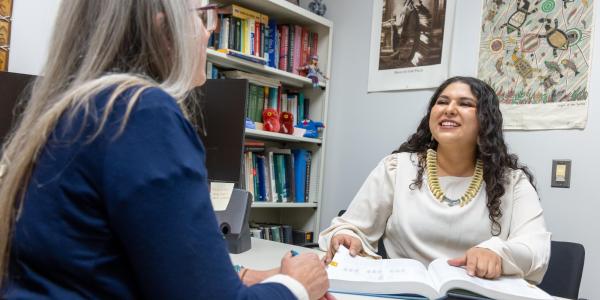Recycle your Associate of Applied Science degree into a Bachelor's degree in Professional Studies
Interested? Request more information
Credit hours: 60* + (60 AAS Degree Credits**)
Part-time or Full-time
Online or In-Person
Start terms: Fall, Spring, Summer
*Some students may need additional credits to satisfy requirements. **Assumes 60 or so transfer credits from AAS
The Bachelor of Applied Science: Professional Studies (BAS-PS) degree is geared toward individuals who have earned an Associates of Applied Sciences (AAS) degree at any Colorado community college. In the BAS program, students stack credentials (i.e. applied/skills-based certificates), gaining transcript-verified certificates on their path to degree completion. Certificates can be earned in one of three areas of development: Professional Skills; Communication and Leadership; and Justice, Equity, Diversity, and Inclusion.
Our BAS-PS degree is more flexible than many other BAS degrees offered in the state and offers AAS holders the opportunity for further education and development to support their upskilling and/or leadership-focused career development goals. The certificates available in this program are all available fully online and can be designated on a transcript prior to graduation.
How does the BAS-PS work?
Complete any two of the listed certificates*, along with the knowledge area courses and graduation requirements.
You may complete the certificates via any of the courses listed on the linked certificate catalog pages, or you may follow the recommended pathways for each certificate.
Note that courses not listed on the recommended pathways list may have additional prerequisite requirements in addition to the 12 credit hours for the certificate or may not align as neatly with the CU Denver and CLAS core requirements, resulting in additional required credit hours. All courses on the recommended pathway are available online or in-person, while courses outside the recommended pathway might not be available in all instruction modes.
*This list is not comprehensive and may not include all approved certificates. Reach out to the Program Administrator for an updated list of offerings!
Professional Skills Certificates:
Communication and Leadership Certificates:
JEDI Certificates:
Cater your degree
The BAS-PS degree lets you to choose your path from an array of certificates, allowing you to design your BAS degree based on your interests and career goals. The course pathways offered in the BAS program include a variety of professional skills areas, such as data science, tecchnical writing, leadership, civics and public policy, and more.
Stackability
The BAS-PS degree is built by stacking multiple undergraduate certificates. You will also have an opportunity to have each completed certificate designated on your transcript prior to graduation, allowing you to feature the credential on your resume.
Flexibility
Our BAS-PS degree is more flexible than other BAS degrees offered in Colorado for course selection. The skills and knowlege gained in the BAS-PS are versitile, relevant and can be applied to careers in almost every industry.

To earn your BAS-PS degree, you must complete (or transfer in comparable credit):
-
Two 12-credit hour applied/skills-based certificates – see Curriculum for certificate list
-
Two 3-credit hour knowledge area courses
-
All CU Denver university core requirements
-
All CLAS graduation requirements*
*The second language requirement is waived for BAS-PS students

For academic advising on major requirements, please contact the Program Administrator, Olesia Stockhold or Program Director, Paul Le.
olesia.stockhold@ucdenver.edu or paul.le@ucdenver.edu
For academic advising on general graduation, CU Denver Core Curriculum, and CLAS Graduation requirements, please contact CLAS Academic Advising or schedule an appointment with your assigned CLAS Academic Advisor.
303-315-7100
Did you earn an Associate of Applied Science (AAS) degree and do you meet any of the following criteria? If so, the BAS-PS degree may be for you!
-
Are you looking to upskill or move into a more knowledge-based and/or leadership focused role in your career?
-
Are you looking for a shorter path to pursue a professional-skills focused bachelor's degree?
-
Are you a part-time or working student with less time to dedicate to earning your degree?
-
Are you looking to complete a bachelor's degree fully or partially online?
Our BAS-PS program is designed with working professionals in mind. The BAS-PS centers on a 30 credit hour major, and overlaps with CU Denver and CLAS graduation requirements. This makes it possible for students bringing in 15 gen ed credits from their AAS degree to complete the BAS-PS in about 60* additional credits. Furthermore, it is possible to complete the BAS degree, with the major and graduation requirements, completely or partially online, making it ideal for working or part-time students.
*60 credit hours is the average number of credits a student will earn to complete the BAS-PS. 60 credit hours assumes transfer of a completed AAS degree only. Credits earned from another institution beyond the AAS may also be eligible for transfer, though subject to evaluation. Please contact the Program Administrator, Olesia Stockhold, for more information regarding your transfer credit.

BAS Certificate Learning Outcomes
Data Science Essentials
- Have basic programming ability in a language popular in data science (e.g., Python, R, Julia)
- Be able to extract, manipulate, and visualize data.
- Understand probability and statistics to quantify uncertainty.
- Be able to build complex models for finding patterns and explaining data.
Professional Skills
- Communicate their ideas in a clear and organized manner.
- Use their compositional and analytical skills in a chosen professional writing field.
- Demonstrate proficiency in digital and media literacy or data literacy.
- Devise problem-solving strategies with the skills developed through the certificate.
Technical and Professional Writing
- Identify contexts and audiences to make more human-centered, accessible, and innovative texts.
- Assess and engage project management and collaboration tools and strategies to write in teams and coordinate complex writing projects.
- Write and design content for digital contexts.
- Identify and write across a range of technical and professional writing genres.
- Analyze ethical issues in writing, science, and technology and identify cultural and social impacts of writing.
Mediation
- Articulate the key theories and assumptions of conflict management research, negotiation skill development, and mediation practice.
- Develop skills for effective negotiation and third-party mediation services.
- Analyze current mediation research and practices.
- Design mediation structures and plans for successful mediation intervention.
Civics, Public Policy, and Equity
- Develop critical thinking and written communication skills.
- Explain and analyze historical and contemporary aspects of American political institutions and civic engagement.
- Describe and examine the formulation, analysis, and critique of public policy.
- Discuss and evaluate how equity/inequity operates in politics and society.
Strategic Communication
- Demonstrate knowledge of the field of public relations including key figures who influenced the field and major trends in the development of public relations as it is practiced today, as well as identify and avoid outmoded perceptions of the PR industry.
- Define public relations and related concepts (e.g. publicity, advertising, marketing, press agentry, public affairs, lobbying, investor relations, social networking, and branding).
- Take into consideration current internal and external business drivers for client or employer and how industry forces and revenue/expenses impact stakeholder analysis and public relations planning.
- Conduct professional activities in a principled manner and adhere to commonly accepted standards for professional behavior while demonstrating integrity and an understanding of ethical issues in public relations.
- Uphold applicable international, national, state, and local laws regarding defamation of character (e.g. libel and slander), corporate governance, disclosure, copyright, trademarks, fair use, and First Amendment issues, privacy laws.
- Identify strengths, weakness, needs, and lead times of various media.
- Identify media and distribution channels appropriate for internal and external audiences, as well as influencers.
- Enact the 9 stages of strategic communication.
- Identify and respect a range of differences among target audiences using culturally and linguistically appropriate strategies and tactics.
- Demonstrate familiarity with communication theory and public relations research that guides planning, prioritizing audiences, developing messages, selecting spokespeople, and establishing credibility and trust.
- Articulate the phases of crisis communication and assess the different needs of each phase.
- Consider audiences and objectives for each of the media and distribution types
Justice, Allyship, Diversity and Equity
- Understand how justice, allyship, diversity, and equity intersect.
- Recognize the diversity of experiences and perspectives across social groups and cultures.
- Identify factors that contribute to historic and contemporary social inequalities across multiple dimensions including race, ethnicity, gender, sexual orientation, disability status, socio-economic status, immigration status, religion, and age.
- Apply foundational theoretical perspectives on the reproduction of inequality in institutional structures, laws, and policies.
- Critically analyze the metrics used for monitoring and evaluating, and promoting diversity, equity, and inclusion in organizational contexts.
- Develop skills to advocate for, implement and assess policies and actions aimed at fostering justice and inclusion in a variety of social and organizational contexts.
Spanish for the Health Professions
- Communicate with their patients in Spanish in a culturally sensitive way.
- Write in Spanish, using the learned medical vocabulary in appropriate contexts. Write questions, instructions, prescriptions, diagnoses, etc., in Spanish.
- Read and comprehend Spanish articles related to the Healthcare field.
- Express an understanding of the cultural beliefs and social structures that affect men’s and women’s health in Latin America and the USA.
Cultural Diversity Studies
Marginalization
- Explanation of theories and histories of marginalization and discrimination
- Discussion of implications of biased treatment on contemporary events
Social Access and Rights
- Identification of diverse social positions
- Analysis of how social positions affects access
Collective Identities
- Description of evolution and social construction of collective identities
Self Awareness
- Awareness of one’s own attitudes and identities in the context of cultural diversity
- Recognition of the connection between one’s own attitudes and identities and personal and professional interactions
Contributions
- Summarization of contributions and impact by diverse groups to institutions and society
